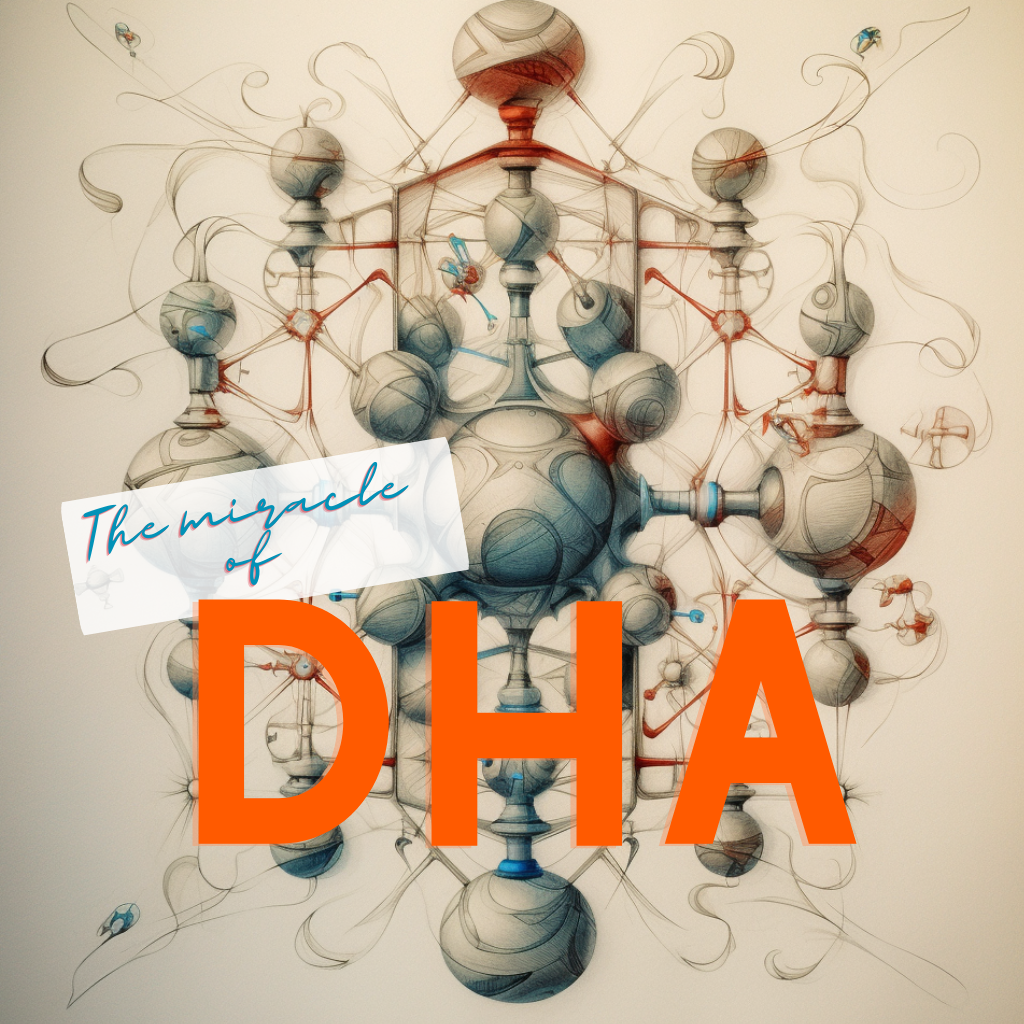Unraveling the Power of DHA Omega-3 fatty acid
in protecting the brain
If you’ve ever found yourself standing in the vitamin aisle, captivated by the array of supplements promising to boost your health, you’re not alone. The world of health supplements can be a labyrinth, but one stands out regarding power, simplicity, and promising results: Omega-3 fatty acids.
There is one remarkable Omega-3 fatty acid that has come to the forefront when it comes to brain health, and that is docosahexaenoic acid (DHA). New studies are now propelling DHA further into the spotlight, suggesting it might be the key to unlocking cognitive potential and countering the decline associated with aging and dementia.
In this article, I would like to delve into fascinating research, exploring the science behind the claims and shedding light on why Omega-3 is a must-have in your health regimen.
Omega-3 Fatty Acids: A Brain Health Ally
Omega-3 fatty acids, primarily DHA (docosahexaenoic acid), are the unsung heroes of brain health. They play crucial roles in brain physiology and biological activities, increasing neuronal membrane fluidity, enhancing cerebral blood flow, reducing inflammation, and slowing down the degradation of nerve tissues.
Recent studies have started to piece together the Omega-3 puzzle, unveiling exciting links between Omega-3 levels and cognitive function. For example, research has shown that Omega-3s are associated with reduced cognitive decline in normal aging and may benefit memory and language functions—areas profoundly affected by Alzheimer’s Disease (AD).
But the Omega-3 magic doesn’t stop there. Higher DHA levels have also been shown to reduce volume loss in the hippocampus, the brain region critical for learning and memory. These fatty acids are also essential for preserving the integrity of the Blood-Brain Barrier (BBB), the brain’s security system, which controls what gets in and out of your brain.
Navigating the Blood-Brain Barrier
The BBB is a highly selective semipermeable border that separates the circulating blood from the brain and extracellular fluid in the central nervous system. It acts like a security guard at a nightclub, only allowing specific molecules to enter and exit the brain.
Disruption to this critical system can lead to inflammation, which can lead to cognitive impairment and various neurological disorders. The great news is that Omega-3 fatty acids have been shown to play an essential role in preserving BBB integrity, adding to the brain-health-boosting properties of DHA.
Squid (Calamari) Oil – the highest source of DHA, the brain protecting Omega 3
The source of your Omega-3 matters. Not all Omega-3 supplements are created equal, and the differences can profoundly affect your and your dog’s brain health.
Squid oil also boasts the highest DHA content among all marine sources. Furthermore, squid oil is more sustainable and environmentally friendly than fish oil, as squids grow quickly, reproduce in large numbers, are not overfished, and their population is rising due to the decline of the fish population, it’s natural predator.
Navigating life’s later stages and watching our dogs do the same can raise concerns over cognitive decline like Alzheimer’s and dementia. We’ve all experienced this worry to some extent, either for ourselves, our loved ones, or our aging pets.
Science shows that cognitive decline isn’t inevitable, and DHA is a shining star in brain health. By choosing an Omega-3 supplement derived from squid, you’re taking a crucial step towards protecting your or your dog’s brain and making a sustainable choice for the planet.
I feel encouraged by knowing the difference DHA can make in the lives affected by cognitive decline—your own, those of your loved ones, and your pets. Having a safe, simple natural, scientifically supported solution to support brain health is truly exciting!
References:
- Bazinet, R. P., & Layé, S. (2014). Polyunsaturated fatty acids and their metabolites in brain function and disease. Nature Reviews Neuroscience, 15(12), 771–785. https://doi.org/10.1038/nrn3820
- Dyall, S. C. (2015). Long-chain omega-3 fatty acids and the brain: a review of the independent and shared effects of EPA, DPA and DHA. Frontiers in Aging Neuroscience, 7, 52. https://doi.org/10.3389/fnagi.2015.00052
- Yurko-Mauro, K., Alexander, D. D., & Van Elswyk, M. E. (2015). Docosahexaenoic acid and adult memory: a systematic review and meta-analysis. PloS one, 10(3), e0120391. https://doi.org/10.1371/journal.pone.0120391
- Zhang, Y., Chen, J., Qiu, J., Li, Y., Wang, J., & Jiao, J. (2016). Intakes of fish and polyunsaturated fatty acids and mild-to-severe cognitive impairment risks: a dose-response meta-analysis of 21 cohort studies. The American Journal of Clinical Nutrition, 103(2), 330–340. https://doi.org/10.3945/ajcn.115.124081
- Pifferi, F., Roux, F., Langelier, B., Alessandri, J. M., Vancassel, S., Jouin, M., Lavialle, M., & Guesnet, P. (2005). (n-3) polyunsaturated fatty acid deficiency reduces the expression of both isoforms of the brain glucose transporter GLUT1 in rats. The Journal of Nutrition, 135(9), 2241–2246. https://doi.org/10.1093/jn/135.9.2241
- Abbott, N. J., Rönnbäck, L., & Hansson, E. (2006). Astrocyte–endothelial interactions at the blood–brain barrier. Nature Reviews Neuroscience, 7(1), 41–53. https://doi.org/10.1038/nrn1824
- Pan, Y., Khalil, H., & Nicolazzo, J. A. (2019). The Impact of Docosahexaenoic Acid on Alzheimer’s Disease: Is There a Role of the Blood-Brain Barrier?. Current Clinical Pharmacology, 14(2), 97-104. https://pubmed.ncbi.nlm.nih.gov/26338174/


